The End of Poverty 豆瓣
作者:
Jeffrey Sachs
Penguin
2005
- 4
Jeffrey Sachs draws on his remarkable 25 years' experience to offer a thrilling and inspiring vision of the keys to economic success in the world today. Marrying vivid storytelling with acute analysis, he sets the stage by drawing a conceptual map of the world economy and explains why, over the past 200 years, wealth and poverty have diverged and evolved across the planet, and why the poorest nations have been so markedly unable to escape the trap of poverty. Sachs tells the remarkable stories of his own work in Bolivia, Poland, Russia, India, China and Africa to bring readers with him to an understanding of the different problems countries face. In the end, readers will be left not with an understanding of how daunting the world's problems are, but how solvable they are and why making the effort is both our moral duty and in our own interests.


